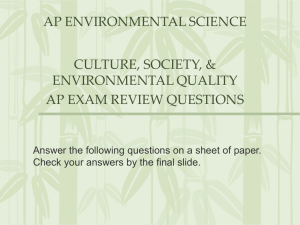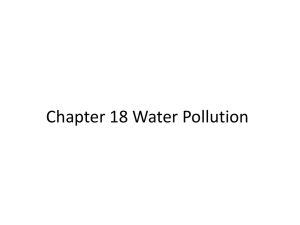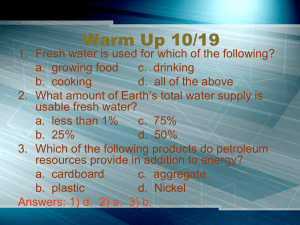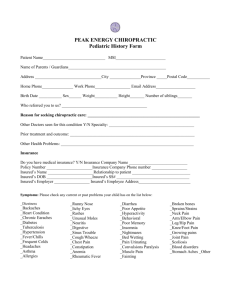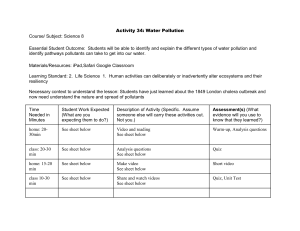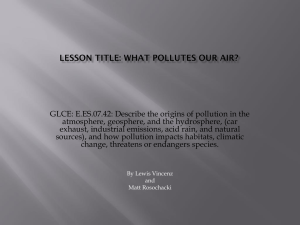named peril limited exception for a short
advertisement
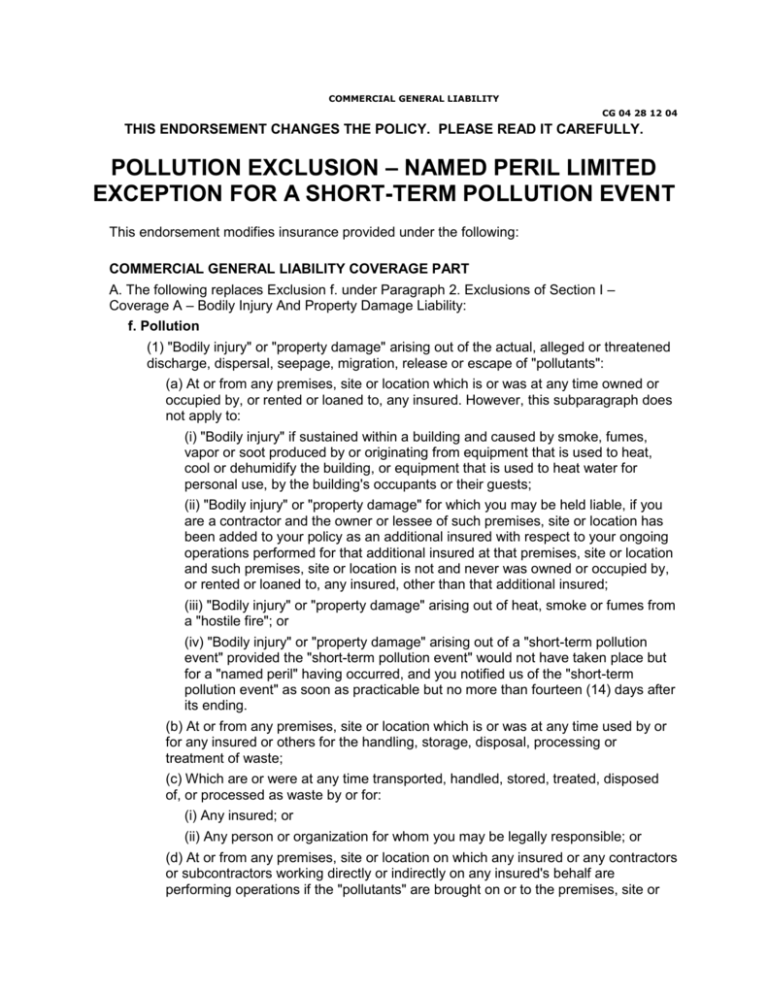
COMMERCIAL GENERAL LIABILITY CG 04 28 12 04 THIS ENDORSEMENT CHANGES THE POLICY. PLEASE READ IT CAREFULLY. POLLUTION EXCLUSION – NAMED PERIL LIMITED EXCEPTION FOR A SHORT-TERM POLLUTION EVENT This endorsement modifies insurance provided under the following: COMMERCIAL GENERAL LIABILITY COVERAGE PART A. The following replaces Exclusion f. under Paragraph 2. Exclusions of Section I – Coverage A – Bodily Injury And Property Damage Liability: f. Pollution (1) "Bodily injury" or "property damage" arising out of the actual, alleged or threatened discharge, dispersal, seepage, migration, release or escape of "pollutants": (a) At or from any premises, site or location which is or was at any time owned or occupied by, or rented or loaned to, any insured. However, this subparagraph does not apply to: (i) "Bodily injury" if sustained within a building and caused by smoke, fumes, vapor or soot produced by or originating from equipment that is used to heat, cool or dehumidify the building, or equipment that is used to heat water for personal use, by the building's occupants or their guests; (ii) "Bodily injury" or "property damage" for which you may be held liable, if you are a contractor and the owner or lessee of such premises, site or location has been added to your policy as an additional insured with respect to your ongoing operations performed for that additional insured at that premises, site or location and such premises, site or location is not and never was owned or occupied by, or rented or loaned to, any insured, other than that additional insured; (iii) "Bodily injury" or "property damage" arising out of heat, smoke or fumes from a "hostile fire"; or (iv) "Bodily injury" or "property damage" arising out of a "short-term pollution event" provided the "short-term pollution event" would not have taken place but for a "named peril" having occurred, and you notified us of the "short-term pollution event" as soon as practicable but no more than fourteen (14) days after its ending. (b) At or from any premises, site or location which is or was at any time used by or for any insured or others for the handling, storage, disposal, processing or treatment of waste; (c) Which are or were at any time transported, handled, stored, treated, disposed of, or processed as waste by or for: (i) Any insured; or (ii) Any person or organization for whom you may be legally responsible; or (d) At or from any premises, site or location on which any insured or any contractors or subcontractors working directly or indirectly on any insured's behalf are performing operations if the "pollutants" are brought on or to the premises, site or location in connection with such operations by such insured, contractor or subcontractor. However, this subparagraph does not apply to: (i) "Bodily injury" or "property damage" arising out of the escape of fuels, lubricants or other operating fluids which are needed to perform the normal electrical, hydraulic or mechanical functions necessary for the operation of "mobile equipment" or its parts, if such fuels, lubricants or other operating fluids escape from a vehicle part designed to hold, store or receive them. This exception does not apply if the "bodily injury" or "property damage" arises out of the intentional discharge, dispersal or release of the fuels, lubricants or other operating fluids, or if such fuels, lubricants or other operating fluids are brought on or to the premises, site or location with the intent that they be discharged, dispersed or released as part of the operations being performed by such insured, contractor or subcontractor; (ii) "Bodily injury" or "property damage" sustained within a building and caused by the release of gases, fumes or vapors from materials brought into that building in connection with operations being performed by you or on your behalf by a contractor or subcontractor; (iii) "Bodily injury" or "property damage" arising out of heat, smoke or fumes from a "hostile fire"; or (iv) "Bodily injury" or "property damage" arising out of a "short-term pollution event" provided the "short-term pollution event" would not have taken place but for a "named peril" having occurred, and you notified us of the "short-term pollution event" as soon as practicable but no more than fourteen (14) days after its ending. (e) At or from any premises, site or location on which any insured or any contractors or subcontractors working directly or indirectly on any insured's behalf are performing operations if the operations are to test for, monitor, clean up, remove, contain, treat, detoxify or neutralize, or in any way respond to, or assess the effects of, "pollutants". (2) Any loss, cost or expense arising out of any: (a) Request, demand, order or statutory or regulatory requirement that any insured or others test for, monitor, clean up, remove, contain, treat, detoxify or neutralize, or in any way respond to, or assess the effects of, "pollutants"; or (b) Claim or suit by or on behalf of a governmental authority for damages because of testing for, monitoring, cleaning up, removing, containing, treating, detoxifying or neutralizing, or in any way responding to, or assessing the effects of, "pollutants". However, this paragraph does not apply to liability for damages because of "property damage" that the insured would have in the absence of such request, demand, order or statutory or regulatory requirement, or such claim or "suit" by or on behalf of a governmental authority. B. The following are added to the DefinitionsSection: 1. "Named Peril" means: a. Lightning, windstorm or earthquake; b. Explosion, implosion, collapse, puncture, bursting, rupture, collision, or overturn of a tank, a vessel, machinery, equipment, or other similar apparatus or device (other than an "auto"), including any attached piping, pumps or valves, if the explosion, implosion, collapse, puncture, bursting, rupture, collision, or overturn is not caused by deterioration, corrosion, erosion, decay, rotting or wear and tear; or c. Vandalism or malicious mischief by someone other than an insured. 2. "Short-term pollution event" means a discharge, dispersal, release or escape of "pollutants" which: a. Begins during the policy period; b. Begins at an identified time and place; c. Ends, in its entirety, at an identified time within forty-eight (48) hours of the beginning of the discharge, dispersal, release or escape of the "pollutants"; and d. Does not originate from an "underground storage tank". To be a "short-term pollution event", the discharge, dispersal, release or escape of "pollutants" need not be continuous. However, if the discharge, dispersal, release or escape is not continuous, then all discharges, dispersals, releases or escapes of the same "pollutants" from essentially the same source, considered together, must satisfy Provisions a. through d. of this definition to be considered a "short-term pollution event". 3. "Underground storage tank" means any storage tank, including any attached pumps, valves or piping, buried below the surface of the ground or water, or which, at any time, had been buried under the surface of the ground or water and then subsequently exposed by any means. For the purposes of this definition, buried means that at least 10% of it is below the surface of the ground or water. © ISO Properties, Inc.
